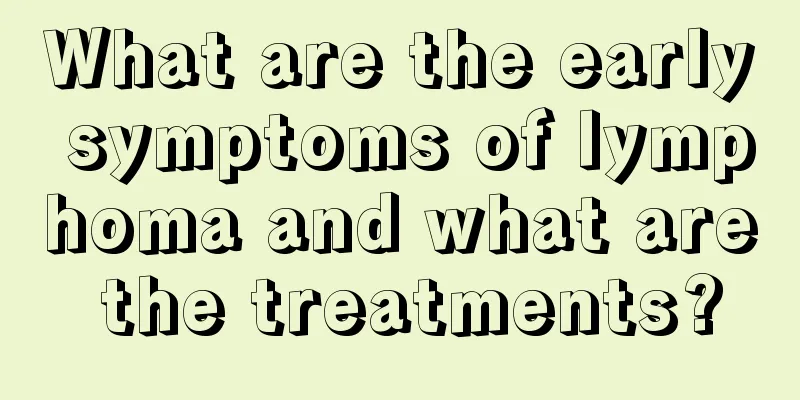What are the early symptoms of lymphoma and what are the treatments?

|
What are the early symptoms of lymphoma? What is the treatment method? Malignant lymphoma is a large and heterogeneous type of cancer. Although it is more likely to occur in lymph nodes, due to the distribution characteristics of the lymphatic system, lymphoma is a systemic disease that can invade almost any tissue and organ in the body. The clinical manifestations of malignant lymphoma have certain common characteristics, but also vary greatly according to different pathological types, sites of invasion and ranges. Malignant lymphoma may present systemic symptoms such as fever, itching, night sweats and weight loss before or at the same time as lymphadenopathy is discovered. 10% to 20% of patients may have anemia when diagnosed with malignant lymphoma. Some patients may have increased white blood cell count, thrombocytosis, and increased erythrocyte sedimentation rate. Some patients may have leukemoid reactions and a significant increase in neutrophils. The increase in lactate dehydrogenase is related to tumor load. Some patients, especially those in the advanced stage, show abnormal immune function. In B-cell NHL, varying amounts of monoclonal immunoglobulins can be detected in the serum of some patients. What is the treatment for early stage lymphoma? 1. Radiotherapy Some types of lymphoma can be treated with radiotherapy alone in the early stages. Radiotherapy can also be used for consolidation therapy after chemotherapy and adjuvant therapy during transplantation. 2. Chemotherapy for lymphoma chemotherapy is often combined with targeted therapy drugs and biological agents. In recent years, chemotherapy regimens for lymphoma have been greatly improved, and the long-term survival of many types of lymphoma has been greatly improved. 3. Bone marrow transplantation: For patients under 60 years old, medium- and high-risk patients who can tolerate high-dose chemotherapy, autologous hematopoietic stem cell transplantation can be considered. Some young patients with relapse or bone marrow invasion can also consider allogeneic hematopoietic stem cell transplantation. |
<<: What are the symptoms of stomach cancer during pregnancy
>>: What are the symptoms of stomach cancer
Recommend
Early stage toenail melanoma
Toes are an important joint landmark of the human...
How to hang curtains
After decorating their house, every family will i...
Suffering from insufficient blood supply to the heart at the age of thirty
With the development of society, many diseases th...
How does leucorrhea with mixed blood produce small cervical cancer? What should we pay attention to in preventing cervical cancer?
Leucorrhea with bright red blood or leucorrhea mi...
How to remove the odor of pig's feet
Pig's feet are pig's trotters, which are ...
What to do if the guitarist gets blisters
Most of the blisters on guitarists can be wiped w...
Are myopic sunglasses good for your eyes?
For people who wear myopia glasses, it would be b...
What causes cervical cancer
More than 95% of cervical cancers are caused by H...
How many days after dyeing can you wash your hair? You must pay attention to these matters
For female friends, dyeing hair is a common thing...
How to fix hair that is too yellow
If you find that your hair is too yellow during t...
Is sirloin beef?
Beef is a common meat in our daily life. Many peo...
What causes lip spots?
If you have spots on your lips, you should pay at...
What happens to the diaphragm during inhalation?
Breathing is a very critical part of the human bo...
Phimosis surgery?
In life, many people suffer from phimosis. Everyo...
What causes swollen fingers
Fingers are used most frequently in our daily liv...









